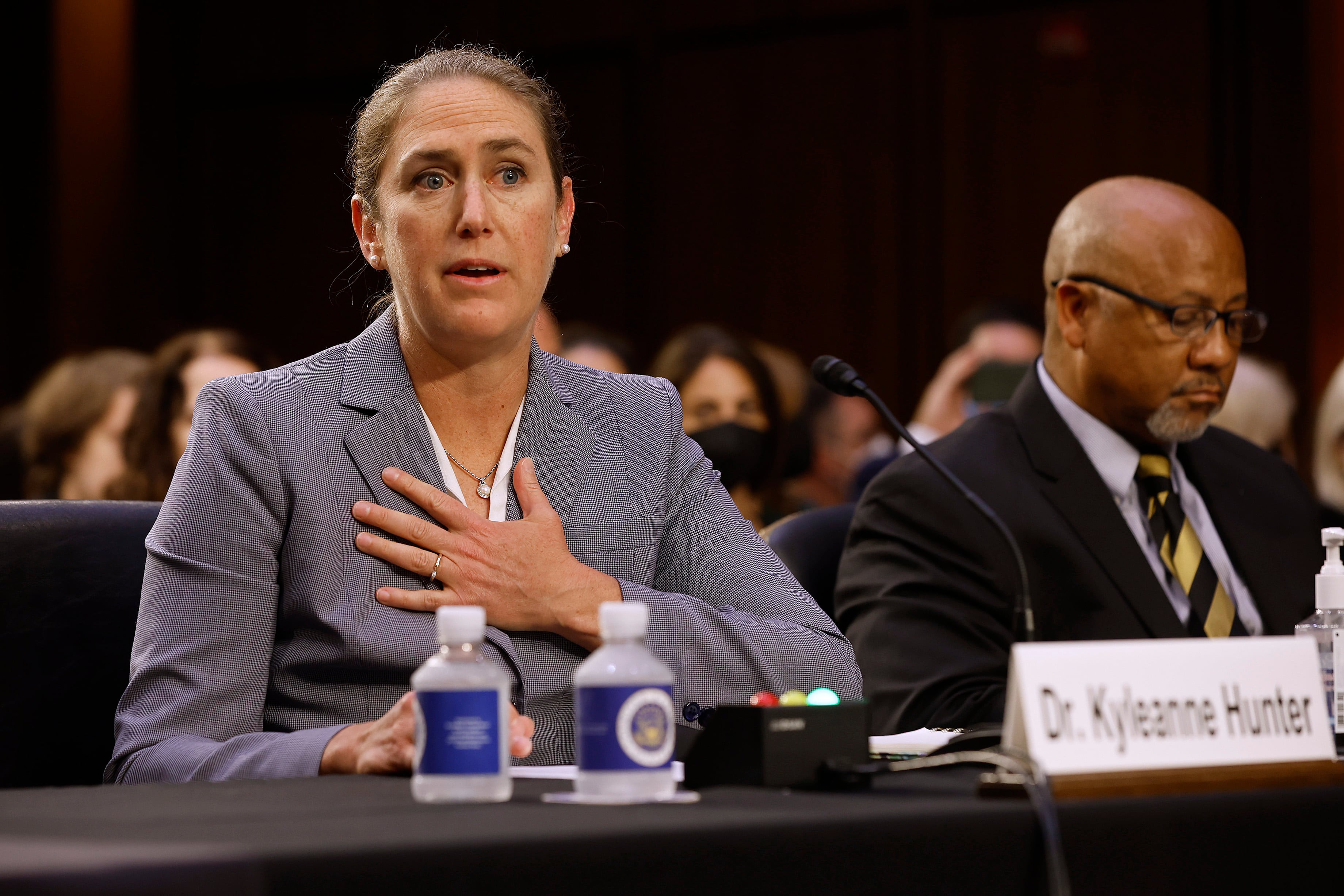The Air Force Academy inspector general's inspection of the school's athletic department uncovered five significant deficiencies, according to a redacted version of the report obtained by Air Force Times through the Freedom of Information Act.
But three of those significant deficiencies were apparently redacted from the , as they and do not appear in the unredacted portions of the 34-page report provided to Air Force Times. And the redacted report sheds no light on allegations in an August Colorado Springs Gazette investigation into drug use, sexual assault and other misconduct in the athletic department in 2010 and 2011. this add ok?mh
SL MOVED UP[[The academy announced the inspection in August, after the Colorado Springs Gazette published its an investigation into drug use, sexual assault and other misconduct in the athletic department in 2010 and 2011. At that point, the academy it said, the inspection was already in the works.
SL MOVED UP[["I continue to pledge transparency and an emphasis on cadet development that provides the right culture and climate," the academy superintendent, Lt. Gen. Michelle Johnson, said in that statement, posted online Aug. 3. The inspection, along with other programs implemented, "will help in eliminating subcultures at the Air Force's academy whose climates do not align with our institutional core values."
SL ADD[[But the released portions of the report do not shed any light on such subcultures, or how the academy might eliminate them.
In the two In the first unredacted significant deficienciesy, the IG:
-- Dinged the athletic department's publications manager for not periodically reviewing all of its publications every four years, as required by Air Force rules. The report said that 29 of 36 athletic department operating instructions are currently overdue for a review.
-- The second and only other unredacted significant deficiency kKnocked the athletic department's human resources program adviser for not effectively overseeing and administering HR programs. The report specified that athletic department supervisors "failed to maintain and annotate civilian employee records in accordance with published Air Force guidance." For example, some civilian position descriptions were not reviewed annually, some appraisals were not signed by the rater, and some folders did not contain the required forms.
It is unknown what the other three significant deficiencies are. Nearly all of the redactions were justified on the grounds that they contained "pre-decisional, deliberative process privileged information."
The Air Force on March 9 released the a redacted version of the IG's inspection report --nearly five months after in response to an Air Force Times' FOIA request.
Inspection announced in August
The academy announced the inspection in August, after the Colorado Springs Gazette published its an investigation into drug use, sexual assault and other misconduct in the athletic department in 2010 and 2011. At that point, the academy it said, the inspection was already in the works.
"I continue to pledge transparency and an emphasis on cadet development that provides the right culture and climate," the academy superintendent, Lt. Gen. Michelle Johnson, said in that statement, posted online Aug. 3. The inspection, along with other programs implemented, "will help in eliminating subcultures at the Air Force's academy whose climates do not align with our institutional core values."
According to the The Gazette: reported that tThe Air Force investigated allegations of drinking and drug use at a party in 2010 and another party in 2011, and alleged use of date-rape drugs and sexual misconduct at the 2011 party. The investigations that followed those parties led to the expulsion or resignation of 43 cadets, including several athletes. The Office of Special Investigations in 2012 planned to throw a party with informants in the crowd as a sting operation, but canceled it because it feared women would be raped there, the Gazette reported.
The Gazette also quoted fFormer athletic director Hans Mueh as saying told the Gazette that Johnson chewed out the academy's coaching staff and told them continued athletic misconduct "would send the school down the path to Penn State," referring to the massive child sexual abuse scandal involving assistant football coach Jerry Sandusky.
The academy issued a news release Oct. 14 that said the IG's inspection gave the athletic department an overall grade of effective – the third rating on a five-category scale – and that while it found some areas need to improve, it found nothing requiring a follow-up legal investigation.
The academy said the report:
- Found that sequestration and other budget cuts have hurt morale, and that members of the athletic department "had lost a sense of common belonging."
- Recommended ways to improve management of administrative and personnel actions.
- Found that coaches keep cadets' time requirements in mind when balancing the need to train athletically with the need to study, train militarily and develop leadership skills.
The academy did not release the full report then, and Air Force Times filed a FOIA request the same day.
The unredacted findings
The report also found that coaches are in a unique, "ideal position to mentor, develop character and uphold cadet standards" among their cadet-athletes. Coaches are evaluated in part on how well they maintain the academy's professional and ethical standards, and act as a positive role model and mentor to their cadets. And mMany coaches interviewed told investigators about instances where they kicked cadets off their teams due to violations.
The inspectors also found 14 minor deficiencies, such as athletic department guidance conflicting with academy instructions, the department's organizational structure not matching the academy's approved structure that was formally approved by the academy, and the intramural division chief failing to ensure that safety briefings were conducted before soccer and flag football championships and that protective equipment such as shin guards were being worn by participants.
Among oOther minor deficiencies: identified included problems with cadets' physical fitness test; civilian record folders having stickers or cover sheets with personally identifiable information on the outside; and improper holding or documentation of that the athletic department didn't properly hold or document safety training such as fire extinguisher training.
Also Some of the unredacted are portions of the report contain positive assessments of the academy's efforts and facilities. For example, the report listed as a strength that "the athletic department benefits from some of the best athletic facilities in the Mountain West Conference." The report later said that physical education "department leadership attributed a 50 percent decline in physical fitness testing failures and deficiencies due to the upgraded athletic facilities.
What's missing
But many other parts of the report, in addition to the three significant deficiencies, are redacted. The include:
- The executive summary's grades and background information for each of the four major graded areas: managing resources, leading people, improving the unit and executing the mission.
- The effectiveness grades for each subcategory within those major graded areas.
- Each of a dozen recommended improvement areas.
- Entire sections on unit morale and quality of life engagement.
- Deficiencies, or problems, identified on how airmen's time is used.
- Portions of the comments in section on manpower, communication, accountability and others.
The overall grade of "effective" for the athletic department as a whole was left unredacted.
Stephen Losey is the air warfare reporter for Defense News. He previously covered leadership and personnel issues at Air Force Times, and the Pentagon, special operations and air warfare at Military.com. He has traveled to the Middle East to cover U.S. Air Force operations.





